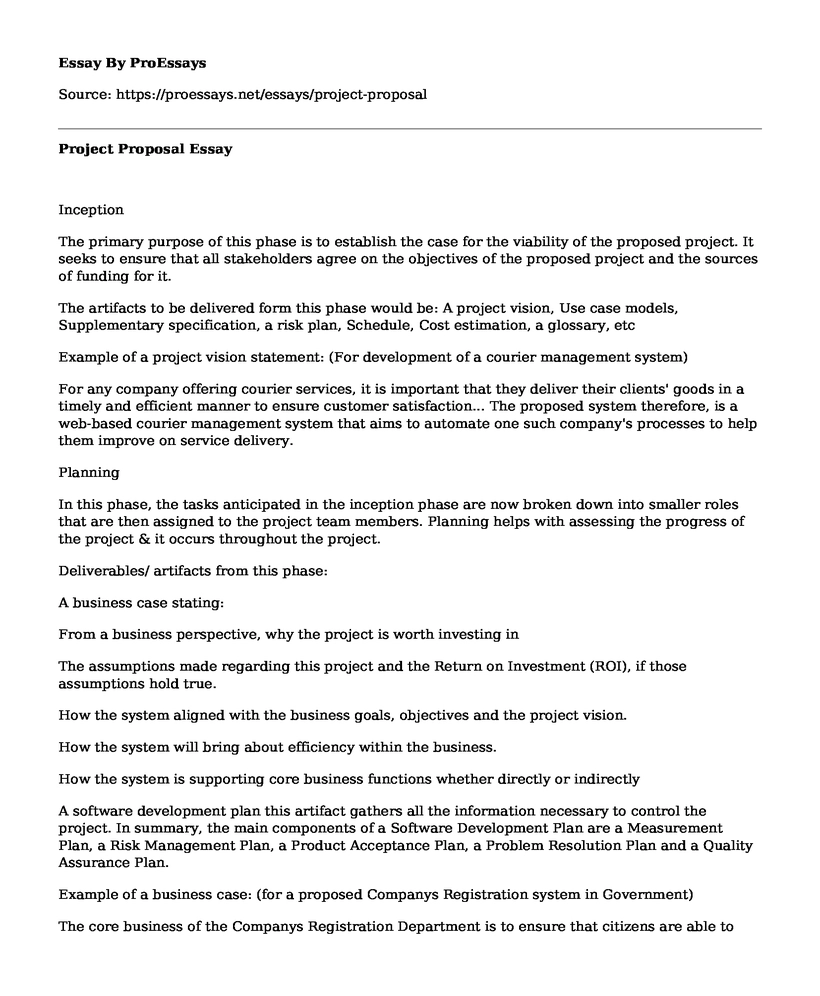Inception
The primary purpose of this phase is to establish the case for the viability of the proposed project. It seeks to ensure that all stakeholders agree on the objectives of the proposed project and the sources of funding for it.
The artifacts to be delivered form this phase would be: A project vision, Use case models, Supplementary specification, a risk plan, Schedule, Cost estimation, a glossary, etc
Example of a project vision statement: (For development of a courier management system)
For any company offering courier services, it is important that they deliver their clients' goods in a timely and efficient manner to ensure customer satisfaction... The proposed system therefore, is a web-based courier management system that aims to automate one such company's processes to help them improve on service delivery.
Planning
In this phase, the tasks anticipated in the inception phase are now broken down into smaller roles that are then assigned to the project team members. Planning helps with assessing the progress of the project & it occurs throughout the project.
Deliverables/ artifacts from this phase:
A business case stating:
From a business perspective, why the project is worth investing in
The assumptions made regarding this project and the Return on Investment (ROI), if those assumptions hold true.
How the system aligned with the business goals, objectives and the project vision.
How the system will bring about efficiency within the business.
How the system is supporting core business functions whether directly or indirectly
A software development plan this artifact gathers all the information necessary to control the project. In summary, the main components of a Software Development Plan are a Measurement Plan, a Risk Management Plan, a Product Acceptance Plan, a Problem Resolution Plan and a Quality Assurance Plan.
Example of a business case: (for a proposed Companys Registration system in Government)
The core business of the Companys Registration Department is to ensure that citizens are able to conveniently and effectively register their companies within the shortest time achievable the manual system in place is hampering the process, and research indicates that with automation, at least 40% more customers can be attended to in a day
Requirements analysis
Here is where one determines what the client needs, not wants. Also, the software features required to satisfy both the system and user/client requirements are determined.
Deliverables/ artifacts from this phase:
Software requirements document This has at least two parts to it:
A system Overview This is the big picture of the application; its objectives, how it relates to other existing software and how it ties to the business process of the company.
A description of functional requirements This details to precision what the system will do. One can either use free text or use cases to aid with this process.
Preliminary design specification - It refines the high level decisions made in the Analysis phase regarding the software system. It also provides the framework to be used in the detailed design.
Example of part of a Software requirements document (for a proposed Companys Registration system in Government)
It is the Government's decision to be fully digitalized by the year 2020. Largely, this process entails automating all ministry operations. Implementing this system within this department will not only help the Government achieve its objective, but will also simplify the workflow as well as help get rid of obsolete technology
Design
After determining what to build, in this phase it is determines how to build it. Design is done in two phases. The first entails coming up with an Architectural Design which identifies the system modules and then a Detailed Design, which is in essence, a detailed design of each module.
Deliverables/ artifacts from this phase:
Design specification this combines the architectural and detailed designs stated above.
Test plan To successfully complete this, one will need to go through the following steps: Analyze the product, Design test strategy, Define test objectives, Plan test environment, Resource planning, Define test criteria, Schedule for estimation & Determine test variables
Example of part of a Test Plan
Design test strategy
To successfully complete this exercise, I will go through the following steps:
Define the scope of testing I will test the software developed; testing each module separately and then the complete unit. I will also test the hardware on which the developed system will run on; hardware specifications, response and compatibility
Identify the testing type
Document risks and issues
Create test logistics
Implementation
This is where the actual coding gets done. It is also understood to be the phase where the software system moves from development to production, or in other words, going-live, rolling out or the installing the system.
Deliverables/ artifacts from this phase:
The software system/ program (source code)
Testing
This entails testing the developed software as per the previously designed test plan.
Deliverables/ artifacts from this phase:
An updated test plan
An updated design specification
Cite this page
Project Proposal. (2021, Mar 09). Retrieved from https://proessays.net/essays/project-proposal
If you are the original author of this essay and no longer wish to have it published on the ProEssays website, please click below to request its removal:
- Paper Example on Attack on Azumer Water
- Fintech Industry Paper Example
- Essay Sample on Economic Implications Cloud Computing
- 2017 Cybercrime: Establishing a Cybersecurity Insurance Firm - Essay Sample
- Essay Sample on Unifying Business with Cloud and Virtualization Tech
- Essay Example on Secure Admin Block: Ensuring Access Control for Optimal Performance
- Paper Example on Interactive Interface Design Under Unguided Multimedia Design







